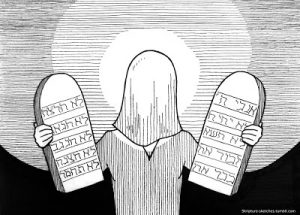Text of a sermon preached at St Margaret’s church, Bramley, Leeds
Sunday 23 February 2020 (last before Lent)
Bible text: Exodus 24:12-18
Moses was exhausted. At his wits’ end. Stressed out. Dare I say, knackered? Let’s just recall what he had achieved in the last year or so, bearing in mind what psychologists tell us are some of the main causes of stress.
First of all, this elderly man had faced up to a near eastern despot; bringing plagues on the country by God’s power using nothing more than a miraculous staff (and constant prayer). Facing up to bullies causes stress – check!
Then, at the Exodus, he led at least a million refugees out of the country by night, through the sea and into the desert, again with nothing more than the miraculous staff and prayer. The responsibilities of leadership cause stress – check!
Once safely out of Egypt their problems hadn’t stopped. Surprise, surprise, there not enough food and water for a million people in the desert. Moses had to face up to a rebellion against his leadership as a result. Being unable to access life’s basic needs causes stress – check! But once again the miraculous staff – and constant prayer – had come in handy.
If that wasn’t enough, he had directed a battle against a hostile tribe, again using that trusty old staff and constant prayer, though this time he was so weak his assistants had to hold his arms up. Warfare causes long term stress – check!
He had already been up the mountain in Sinai once, to receive the Ten Commandments and lots of other regulations, amounting to four pages of closely printed text in our Bibles. But it seems he had to memorise them all at first, because only now is he summoned up the mountain a second time to fetch the written tablets of the Law. While physical and mental exercise are recommended for older people, that was going too far! Over-exertion causes stress – check!
If all that wasn’t enough, somewhere along the way we are told he had separated from his wife, and a while later his father-in-law comes along to have a word in his ear about it. Relationship breakdown causes stress – check!
Finally, until recently he had been acting as judge for the whole people of Israel. Fortunately he had been persuaded by his father-in-law to delegate most of that workload to other people (see, even in-laws can be worth listening to at times!) But that had taken its toll. Sorting out disputes causes stress – check! How many stress factors is that so far? I make it at least seven. It was most definitely time for a break.
So, God calls Moses up the mountain a second time. On this occasion Joshua, who would eventually take over from Moses, comes with him. The instruction from God is clear: “Come up to me on the mountain, and wait there”. I emphasise that word “wait”. We are told that the glory of the Lord settled on the mountain: the word is the same that John uses when he writes that the Word of God “came and dwelt among us” in Jesus. But this was only base camp: the two of them spent seven days there, not yet going into the full presence of God, but waiting. I believe this was Moses’s retreat, and God wanted him to de-stress before calling him to the next phase of his ministry.
This is a good time to think about retreats, as many people do make a retreat in Lent. They are not necessarily about abstinence or physical discomfort, although Moses presumably fasted through this time and slept out in the open. Most retreat centres these days offer good food and a comfortable bed, and there’s nothing wrong with that – it may be just what you need. Ideally, though, the retreat is about renewing your relationship with God, so that you can re-enter the world and its problems with renewed energy, understanding and vision. So what might Moses have got out of his seven-day retreat at Mount Sinai Base Camp?
Firstly, he had time to think. Retreats are not holidays. They are not about pleasure seeking. They may well be about relaxing, and certainly having time and space away from distractions to think clearly. We are told that Moses was a very humble man, and reluctant to speak (which is why Aaron had to go with him to meet Pharaoh). He had spent a long time in the desert alone as a shepherd. In the language of today, he was probably an introvert, someone who finds their strength in solitude. More than most people he needed to get far from the madding crowd. After all the stresses of leading Israel out of Egypt he needed time alone with God -and with himself.
Next, he had the opportunity to let go. Retreats are not about “getting things done”, or even “sorting out problems”. Rather, a retreat should be about leaving the cares of the world behind, to de-stress by handing over all your problems to God. When Linda and I were on the Scargill community, many guests who came to us from busy lives would say they ‘left their cares at the cattle grid’, starting to relax as they came up the drive and into the calmness of our community.
Then, he had time for more reflective prayer. All the praying he had done these last months was intercessory – for his people’s freedom, for their physical needs to be met, for victory in battle, for justice in the courtroom. Now he desperately needed the other sort of prayer – meditation, contemplation, enjoying God’s presence. A balanced prayer life includes both – meditation to take us out of the world and into God, and intercession to face outward to the world and bring its needs to God. But on retreat, the emphasis is on the first.
‘Letting go’ is also about letting others take the strain. “Aaron and Hur are with you; whoever has a dispute may go to them”. No-one is indispensable. Retreats can be about taking time out of daily life, handing over responsibility, letting other people answer the phone and look after the children while you are away – “me time” as well as “God time”.
Once someone on retreat has let go of their cares, relaxed and started to focus on God, then comes the opportunity to hear God’s word. For Moses of course, that was quite literal – at the end of the seven day retreat began another, longer, tougher one – forty days on the mountain top alone with God, but the first week of retreat was essential so that he could be ready to hear God speak.
For most of us that will be through worship, the Bible, other reading, or perhaps pastoral conversations with a retreat leader or chaplain. But always be open to hearing God speak in a more audible way, or by dreams or visions. It does happen.
The retreat is also a place of discernment. At the end of a retreat, ideally there should be a call – a renewed sense of vocation, of having a place in God’s kingdom. Moses went back down the mountain with the tablets of the law, and also with detailed instructions about the building of the tabernacle, the place of worship. In his forty day solo retreat he had come to understand more deeply the nature of God and the way that he should be worshipped, and had that message to pass on to others.
So as we approach Lent, starting this Wednesday, here are some questions to ponder.
- Can I make time for a retreat during Lent? Not necessarily a full week in a recognised retreat centre, but perhaps a quiet day away by myself to spend in relaxation and prayer? Or even just a good long walk, if the weather lets up?
- What are the things that are causing me stress at present? Can I manage to lay them aside for a while? Is there someone I could talk to about them who could help me de-stress? Maybe a family member, as with Moses and his father-in-law, or a friend such as Joshua, or a health professional?
- What are the things that distract me from prayer? Certain people, places, foods, devices? Can I lay them aside for a while – give them up for Lent?
- Does my prayer life need a better balance? More intercession, more Bible reading, or more meditation? What would help with that?
Whatever your answers to these questions – and we are all different – be assured that if you turn aside to look for God, you will find him. Few of us will have as stressful a life as Moses – or Jesus – but just as they found God in the solitude, so can we.

